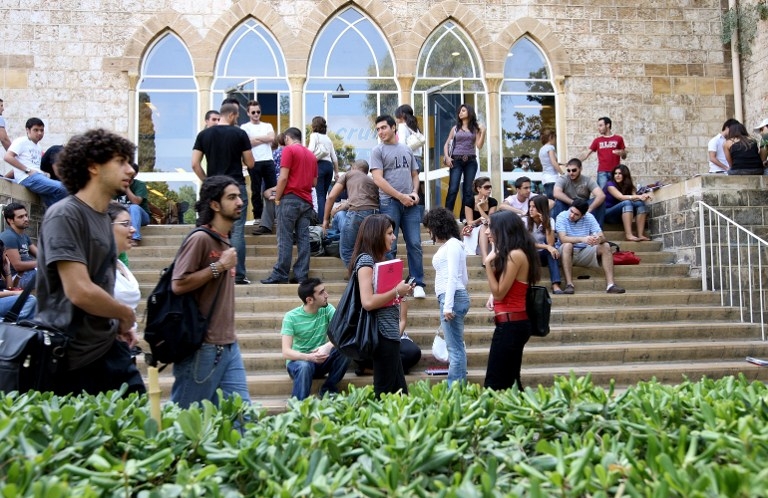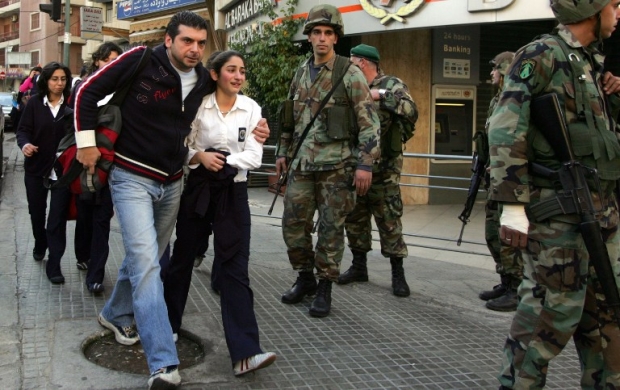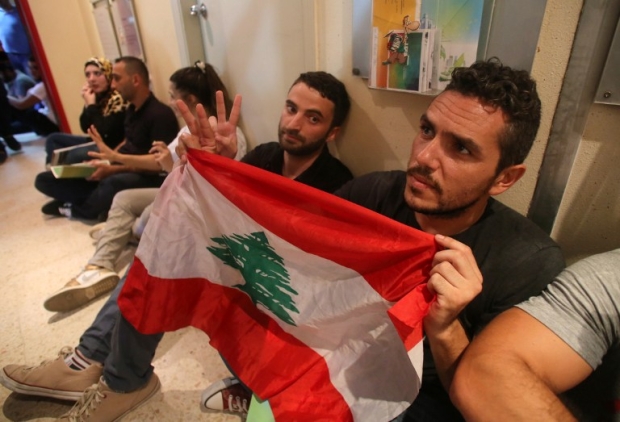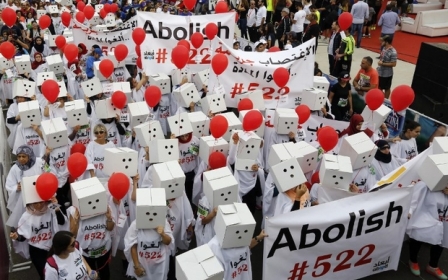Fairuz, Hezbollah and the suppression of democracy on Lebanese campuses

A controversial incident occurred earlier this month at the state-owned Lebanese University between a group of students and Hezbollah at the College of Architecture.
By fanning the flames of sectarian politics, political parties have repelled many students who otherwise would be more vocal and active in supporting alternative student movements
Several students organised a commemoration to celebrate the birthday of classmate Mohammad Hamada, who died in a tragic car accident last October.
The students had received permission from the university administration to hold the event in an outdoor plaza, where they planned release balloons and play some of Hamada’s favourite music, notably songs of Lebanese musical icon Fairuz.
Minutes after the Hamada's friends gathered, students from the university’s Hezbollah chapter interrupted the event, demanding the music be turned off on religious grounds, despite Fairuz being a reported admirer of Hezbollah chief Hassan Nasrallah.
The university administration rescinded the event's permit, asking the students to move it elsewhere. The incident unfolded just one month after a video surfaced online of Hezbollah supporters at the Lebanese University, singing anthems, declaring allegiance and chanting in support of Ali Khamenei, supreme leader of Iran.
So does this mean that Lebanon’s universities are under some Hezbollah or Iran-led hegemony? Somewhat. But that is only about half the story.
Sectarianism rears its ugly head
Student movements are an important driving force in political change. We've seen them do wonders, even in authoritarian countries like Egypt. Massachusetts was the first US state to divest from South African apartheid, and it was driven by a student-faculty initiative.
Lebanon is no different; no lasting change or progress can happen in the country without student movements. But today, Lebanon's student movements are dominated by student-wings of the establishment's political parties
Just as there are misconceptions about Lebanon’s "free press", there is also a misconception about how free the country’s campuses are, which has has resulted in the suppression of true democracy.
Moreover, by fanning the flames of their sectarian politics, political parties have repelled many students who otherwise would be more vocal and active in supporting alternative student movements, fearing for their safety.
The Lebanese establishment, one way or another, has attempted to tighten its grip on both public and private academic arenas, often the spaces of creative and revolutionary political thought and action.
The Cultural Club of the South at the American University of Beirut (AUB), for example, openly honoured an alumnus who lost his life while fighting for Hezbollah in Syria and Prime Minister Saad Hariri of the Future Movement allowed national media to attend a celebration he hosted at his residence with supporters from the Lebanese American University (LAU), who won student elections this autumn.
Sometimes, it gets ugly, particularly when student elections mirror the country’s political dynamics. For example, in student elections, March 14 and March 8 candidates will often run against each other.
While they claim to be civil, non-discriminatory, and independent, sectarianism rears its ugly head as students chant “Ali!” and “Omar!” at one another during the AUB elections - mirroring religious and sectarian divisions between Sunnis and Shia in Lebanese society.
Or when several students at Saint Joseph University (USJ) still refer to the Huvelin campus as “Sheikh Bachir’s Fort”, in reference to former president and leader of the right-wing Christian party, the Kataeb.
The lowest moment in recent years has to be an incident in January 2007 when March 14 accused Hezbollah and Syria of being behind the 2005 assassination of former Prime Minister Rafiq Hariri. During violent clashes between students and protestors at the Beirut Arab University, four people died and at least 25 were injured.
Fuelling the fire
There have always been stints of alternative student movements on Lebanese campuses, notably at AUB. Yet, from 2008, when street fighting erupted and some feared for a new civil war, we have seen a more sustainable growth and since the parliament started extending its own term in 2013, an even bigger expansion.
Just as the establishment has succeeded in monopolising the country’s media and political structures in the guise of a pluralistic democracy, it has done the same with student politics
The garbage crisis and the 2016 municipal elections also inspired young people to support or be part of an often secular, left-leaning alternative outside of the establishment.
Student groups like the Secular Club and Red Oak Club at AUB have been involved in causes on and off campus. While only the former has been running and winning seats during student elections, both have been active in the garbage protests and have been vocal during the recent demonstrations for Beirut’s last public beach, among other causes.
At USJ, Safha Bayda, a student group which means ‘Blank Page’, has been challenging the establishment’s presence on campus and the general Christian-right ideology with which the university is associated. Their slogan is “your past is yours, our future is ours”.
READ MORE: The fight to save Beirut's last beach - and the struggle to save Lebanon
But of course, there is more leeway in private institutions. At the Lebanese University, students (who chose to remain anonymous) from independent groups have told me that it is illegal to form political groups, and that they have had to be on the establishment’s good side to hold events.
Ironically, the primary goal of Lebanese University was to develop a generation of secular and creative students, political analyst and author Bassel Salloukh told me. He described the student movements as “colonisation from within”.
In 2013, in an act of resistance and outrage, students refused to fill out registration forms that required them to enter their sect. The Ministry of Youth and Sports and a university representative responded, condemning the form and reassuring them that it was just an accident.
But with the country’s only public university in shackles, students will only be liberated if they are freed from the establishment.
Force-feeding Lebanon’s political culture
Just as the many faces and entities of the establishment have succeeded in monopolising the country’s media and political structures in the guise of a pluralistic democracy, they have done the same with student politics. But why have they put so much effort and time into it?
Lebanon’s sectarian political culture is high maintenance, especially for a post-civil war generation that, unlike those in the past, blames the government, not other sects, for its socioeconomic and political problems
It’s simple. Lebanon’s sectarian political culture is high maintenance, especially for a post-civil war generation that, unlike those in the past, blames the government, not other sects, for its socioeconomic and political problems.
The emergence and growth of student groups that identify as secular or non-sectarian, coupled with the increased dissatisfaction of the sectarian elite visible during the garbage protests, is a sign.
This is not a flash in the pan: these changes and movements are here to stay. The establishment will do what it can to maintain its momentum and dominate student groups on campuses, especially because many external factors that were expected to lighten the load simply have not.
This isn’t to say that the youth in its entirety is against the establishment and no longer subscribes to any sectarian values, but the process of its dismantlement from everyday life has started.
- Kareem Chehayeb is a Lebanese writer and musician based in Beirut. He is the co-founder of Beirut Syndrome, a grassroots media platform. You can follow him on Twitter @chehayebk
The views expressed in this article belong to the author and do not necessarily reflect the editorial policy of Middle East Eye.
Photo: Lebanese students of the American University in Beirut (AUB) gather at their university campus in 2007 (AFP)
This article is available in French on Middle East Eye French edition.
Middle East Eye propose une couverture et une analyse indépendantes et incomparables du Moyen-Orient, de l’Afrique du Nord et d’autres régions du monde. Pour en savoir plus sur la reprise de ce contenu et les frais qui s’appliquent, veuillez remplir ce formulaire [en anglais]. Pour en savoir plus sur MEE, cliquez ici [en anglais].







